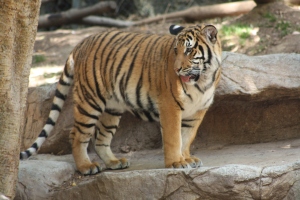A short story in celebration of World Wildlife Day
This was madness and the horrid twist in my gut was telling me it would soon escalate to bloody madness. Raaka, the elephant I was riding with the Mahout Bhavin seemed to share my concerns as she rumbled a warning and flapped her ears forward, a clear sign she was uncomfortable.
Earlier in the day, I had found the paw prints of a tigress with at least two cubs in tow. As we had followed her trail through the thinning trees, the soft yowling ‘bharuu’ calls, tiger talk for “I’m here, where are you?” had given her away on the outskirts of the park. As we had crossed from the Kaziranga border into the fields beyond, the forest rangers had suddenly become incredibly agitated, jabbering at each other and shouting excitedly as they drove the elephants forward into the tall grass and cane. In the far distance I could see the beautiful and striking magenta pink, marigold orange and kingfisher greens of the women’s dresses, intermingled with the dark khaki of the army soldiers and the cornflower blue of the police. The noise of banging pots and pans and what I hoped were just fire crackers popping drifted over the fields towards us.
This after all, was what I was meant to be here to stop. Kaziranga had become famous in the last few years in conservation circles for being the prime example of how not to do it. The national park represented the largest concentration of tigers anywhere in the world, something of which the Indian government were very proud. The reality though, was that the park was far too small to house the growing number of tigers and certainly couldn’t sustain the additional animals being dumped here on a regular basis through a poorly conceived relocation programme.
When tigers got close to villages, left the park borders or attacked livestock as this tigress was suspected of doing, the forest rangers would organise these ridiculous, anarchic, Raj-like drives. Tigers were driven into a bottle neck between the park and local villages where they supposedly would then be easier to tranquilise and remove. Unfortunately the tigers rarely co-operated and more worryingly, the forest rangers were not great shots. All too often, scared and cornered tigers turned on the approaching elephants and rangers. When this happened, the tiger instantly became a ‘problem animal’ and all thoughts of simply subduing it evaporated. The result was often a mauled ranger and a dead tiger. Just this morning we had shown the rangers videos of tigers attacking elephant riders, but apparently to no avail.
Raaka decided now was as good a time as any to satisfy her sweet tooth and ripped a clump of cane from the ground. I went to tap Bhavin on the shoulder to remind him this wasn’t a good idea when I noticed the silence. The elephants had all stopped and were rolling back and forth on their feet. I could see Chahna ahead swishing her head back and forth, tusks low to the ground. They were instinctively clumping together. Then it came, the deafening roar. It started and ended with spitted snarls. A flame of orange had appeared just ahead of Chahna and then it came at us like a forest fire, dancing over the ground in maddened hops of rage. Manish, Chahna’s Mahout fired the tranquiliser rifle. The tigress only hesitated for a second before she bellowed in utter outrage, then she was flying. I was still recovering from being hit in the chest by the roar itself as I watched the tigress’s paw swipe at Manish and make contact as she barreled over Chahna’s side and disappeared again into the grass, this time back towards the forest. Gun’s blazed, panicked cries echoed and Manish was sitting on the ground, holding his mangled hand high above him to stop the blood flow.
We calmed the elephants as best we could. Manish was put back on Chahna with another Mahout and sent off towards the village. But now Samir and I had to persuade our Mahouts to help us find a rather upset tigress. Raaka rumbled her own concerns again as we moved off towards the forest. We didn’t have to go far. Sprawled over the roots of a semal tree on the edge of the forest lay our tigress. Samir was already on the radio, but I was watching the clump of elephant grass that was shaking uncontrollably behind her. A bobbing head holding two piercing amber eyes appeared, and then another. I smiled. The tigress had been my first tiger, her fury and power had been raw, uncontrollable and intensely frightening. I knew how the forest guards and villagers felt. But these cubs were precious, quiet and meek shadows of the wild that needed protection. These were the real tigers and how we needed to make India and the rest of the world see them.

